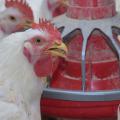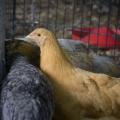Stimulating the setting instinct
The most critical factor for inducing females of any bird species to set on eggs is the amount of daylight each bird is exposed to every day. The increasing length of daylight hours in the spring of the year stimulates the hens to lay and roosters to begin mating. The additional daylight eventually stimulates the hen to "set" on the eggs after a sufficient number of eggs accumulates in the nest. If eggs are removed each day, the hen may never become broody and start incubating or "setting" in the nest.
After the daylength reaches its maximum (June 21) the daylength starts decreasing and egg laying and setting tendencies decrease until the shortest day of the year arrives (December 21). The cycle then begins all over again. In general, hens require about 15-16 hours of continuous light daily to maintain good egg production. These seasonal factors have developed in all birds and most mammals through millions of years of natural evolution.
Hens can be be stimulated to lay or set on eggs during any season of the year if the lighting program they receive is carefully controlled. They must be "tricked" into thinking that they are in the springtime. Place artificial lights in the house and control them with timers so that the daylength is increased to about 17 hours each and every day. Do not vary the daylength that the hens receive or they will cease to lay and set.
After the hen accumulates a nest full of eggs (a clutch) sheinstinctively starts setting and incubating them. The ease to which she accepts this incubation responsibility varies within and among breeds, strains, and families of chickens. Some hens have better "mothering" instincts, while others are not as inclined.
Almost all females will be stirred into setting on the eggs if the daylength is maintained properly and the environment around the hen is good. Provide the hen with dark, secluded areas in which to make her nest. In this way she is not distrubed while setting on the eggs. The quality of the eggs can be maintained until setting begins by replacing good "setting eggs" each day with artificial or infertile eggs. When the hen begins incubating the eggs, all eggs in the nest can be replaced with the stored fertile eggs.
Publications
News
STARKVILLE, Miss. -- Until an avian flu vaccine for chickens or other alternative is federally approved, commercial poultry operations in the U.S.
STARKVILLE, Miss. -- If egg prices have seemed higher than ever lately, it’s because they are, and consumers can place much of the blame squarely at the feet of the ongoing bird flu outbreak.
With highly pathogenic avian influenza, or HPAI, in the environment in Mississippi, owners of backyard flocks have to take extra steps to keep their chickens healthy.
Avian influenza poses an extremely low risk to human health and none to food safety in Mississippi, but its presence poses a risk to backyard flocks and the state’s $3 billion commercial poultry industry.







